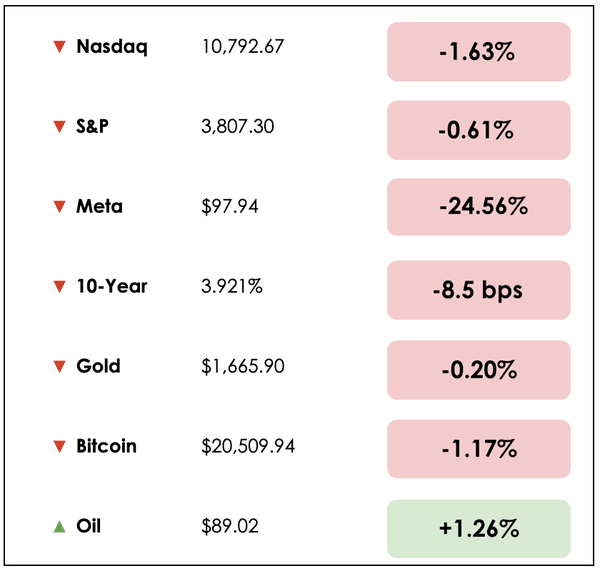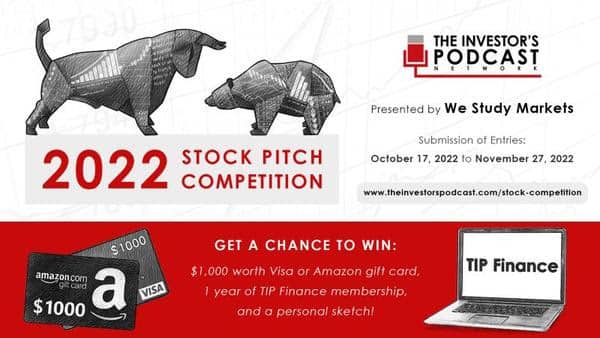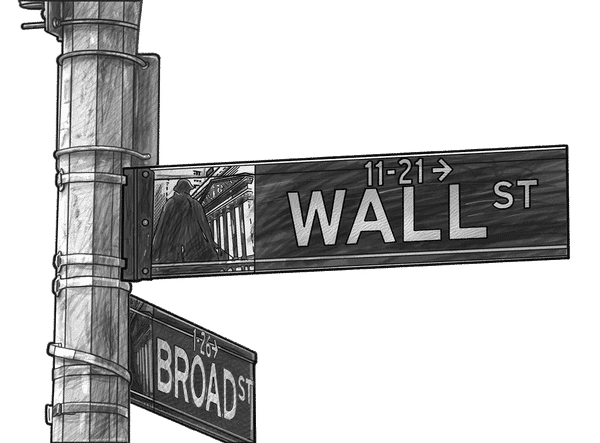Recession Postponed
27 October 2022

Hi, The Investor’s Podcast Network Community!
It was really just two days ago that we said the markets looked like 2021 again (i.e falling rates, tech stocks to the moon, surging Bitcoin price).
🤕 Boy, did the market gods not like that — We take full responsibility for jinxing things. Meta, more commonly known as Facebook, dropped over 24% today after reporting miserable quarterly earnings due to an advertising turndown and mounting internal costs.
🇨🇭 The famous and struggling Swiss bank, Credit Suisse (CS), also got slammed and fell 18% after reporting a $4 billion quarterly loss. In order to stay solvent, it’s selling a near 10% equity stake to the Saudi National Bank while cutting 9,000 employees.
By the way, to make sure you never miss one of our newsletters, add us to your to contacts so we don’t end up in the “junk” folder.
Here’s the market rundown:
*All prices as of market close at 4pm EST
Today, we’ll discuss two things in the news: Updates from the inflation fight in Europe and brand new data on the U.S. economy’s health, plus our main story on investing in one country’s cultural popularity.
All this, and more, in just 5 minutes.
Let’s go! ⬇️
Understand the financial markets
in just a few minutes.
Get the daily email that makes understanding the financial markets
easy and enjoyable, for free.
IN THE NEWS
🇪🇺 European Central Bank Raises Rates To Fight Inflation (WSJ)
Explained:
- The European Central Bank (ECB) announced a 75-basis-point interest rate hike Thursday, sending rates to their highest level since 2009. They also pledged to continue pushing rates up in the coming months to battle record eurozone inflation despite recessionary headwinds.
- According to an ECB statement, inflation remains “far too high.” ECB President Christine Lagarde added, “our job is price stability. A central bank has to focus on its mandate.”
- The ECB also moved to limit payments it makes to eurozone banks that took advantage of ultra-cheap loans during the pandemic, which will ultimately raise borrowing costs for European companies.
Why it matters:
- Investors are closely watching the ECB and other central banks for any signs of a pivot away from outsized interest-rate increases as higher borrowing costs begin to weigh down on the economy.
- The eurozone economy is expected to grow 0.7% in the third quarter, but many economists anticipate it to shrink for the next three quarters due to the impact of higher energy and food prices.
- The euro dropped, and European government bond yields slid after the rate-hike announcement.
📈 Recession Postponed — U.S. GDP Accelerates at 2.6% (FT)
Explained:
- The U.S. economy posted its first quarter of positive growth for 2022 after contracting for the year’s first six months. U.S. gross domestic product increased by 2.6%, beating estimates of 2.3%.
- The growth came in large part due to a narrowing trade deficit, which economists expected, but consider to be a one-off occurrence that won’t repeat in coming quarters.
- Consumer spending advanced just 1.4%, far less than the previous quarter, in a sign the U.S. economy is beginning to slow.
Why it matters:
- Two consecutive quarters of declining GDP have long been considered the common criteria for a “technical recession.”
- The rebound in growth after two straight quarterly declines in GDP provided evidence that the economy is not in a recession. However, the risks of a downturn have increased as the Fed doubles down on rate hikes to battle the highest levels of inflation seen in 40 years.
- The Fed is expected to deliver its fourth consecutive 75-basis-point (0.75%) in early November. As of March, the federal funds rate hovered near zero, making this tightening campaign one of the most aggressive in the history of the U.S. central bank.
BROUGHT TO YOU BY
Inflation keeping you up at night?
Sleep well tonight by knowing you invest in one of the best inflation hedges there is — real estate. Learn more at PassiveInvesting.com.
THE MAIN STORY: INVESTING IN KOREA’S CULTURAL TAKEOVER
Overview
From the film Parasite becoming the first non-English language movie at the Oscars to take home the Best Picture award, to the sweeping cultural phenomenon that was Squid Games, to the rise of K-pop and BTS becoming one of the most popular bands in history, it’s undeniable that Korean culture has dominated the global stage in recent years.
Beyond enjoying Korean films, food, or music, though, is there a way to profit from the country’s social preeminence?
Thanks to 29-year-old Changwon Lee, chief executive of CT Investments and Content Technologies (and self-described K-pop fan), there now is.
What to know
Lee recently launched the “K-pop” ETF (ticker: KPOP). The fund listed on the New York Stock Exchange on September 1st, and it tracks an index of 30 companies engaged in entertainment and interactive media industries listed in South Korea.
This includes the agency, HYBE Co., which manages the hit South Korean boy band BTS that is the most popular artist on Spotify at more than 16.3 billion streams.
Lee said, “what makes us excited about this is being the first vehicle that provides global investors and global fans, who had difficulty investing in K-pop previously, exposure to the companies they have a fan-ship of.”
The fund will use a proprietary AI algorithm to discern if media companies are materially involved in the K-pop space which will then determine their inclusion in the ETF’s corresponding tracking index.
Breaking it down
The ETF is down about 20% since inception, but to its credit, it’s been a rough go for most assets the last two months.
It sports a hefty 0.75% management fee (someone has got to pay for those K-pop AI algorithms), and its assets under management are just above $2 million, so it’s, unsurprisingly, a very niche product.
Should you invest?
Probably not, at least, we aren’t likely to. The point isn’t really whether the K-pop ETF is a good or bad option for serious investors, but rather, to show just how specialized investment products are becoming.
No niche is safe from becoming a security on Wall Street.
High fees for less?
From cannabis to advanced robotics, cloud computing, blockchain, biotechnology, the metaverse, and even an inverse Jim Cramer ETF (the controversial host of CNBC’s “Mad Money”), the boundaries for how you can allocate your money are expanding every day.
It’s an interesting trend because, thanks to Vanguard, using its total world stock market index fund (VT), you can own a fraction of over 9,500 stocks for a 0.07% annual fee.
This stands in sharp contrast to KPOP’s 0.75% fee for specialized bets on just 30 Korean entertainment companies. And many other specialized ETFs charge similar premiums to investors.
It’s clear, then, that fund managers see an opportunity to charge comparatively exorbitant fees for concentrated and obscure bets.
Takeaways
For the long-term, buy-and-hold investor, these sorts of specialty ETFs with higher fees are surely a distraction from their efforts to maximize compound returns over time which begins with minimizing fees as much as possible.
Investing, though, is becoming more personal than ever. Gone are the days when all you could do was auto-contribute to your company’s 401k with only a few preset options.
This may spark greater interest in investing that fosters better financial habits for a new generation with high-free funds like KPOP serving as a gateway drug of sorts.
Perhaps this is just wishful thinking. With that said, niche ETFs do provide investors a way to nimbly make tactical bets on areas of the markets and economy previously not thought possible.
Dive Deeper
While you may not want to hold KPOP for 10+ years in a retirement account, maybe you see a specific catalyst for the industry that you’d like to bet on over several months.
Seems reasonable enough to us.
Readers, let us know, what’s the craziest ETF you’ve ever seen?
You can listen to Bloomberg’s podcast on KPOP to learn more about it here.
**Read more**
Katie Gatti, the author of the Money with Katie newsletter, is obsessed with personal finance—specifically, the loopholes, nuances, and big questions that traditional advice tends to lack.
Her weekly newsletter takes a spicy approach to spending habits, investing best practices, tax strategies, and more. Get simple and practical ways to live a rich life delivered straight to your inbox for free.
SEE YOU NEXT TIME!

That’s it for today on We Study Markets!
See you later!
If you enjoyed the newsletter, keep an eye on your inbox for them on weekdays around 6pm EST, and if you have any feedback or topics you’d like us to discuss, simply respond to this email.












